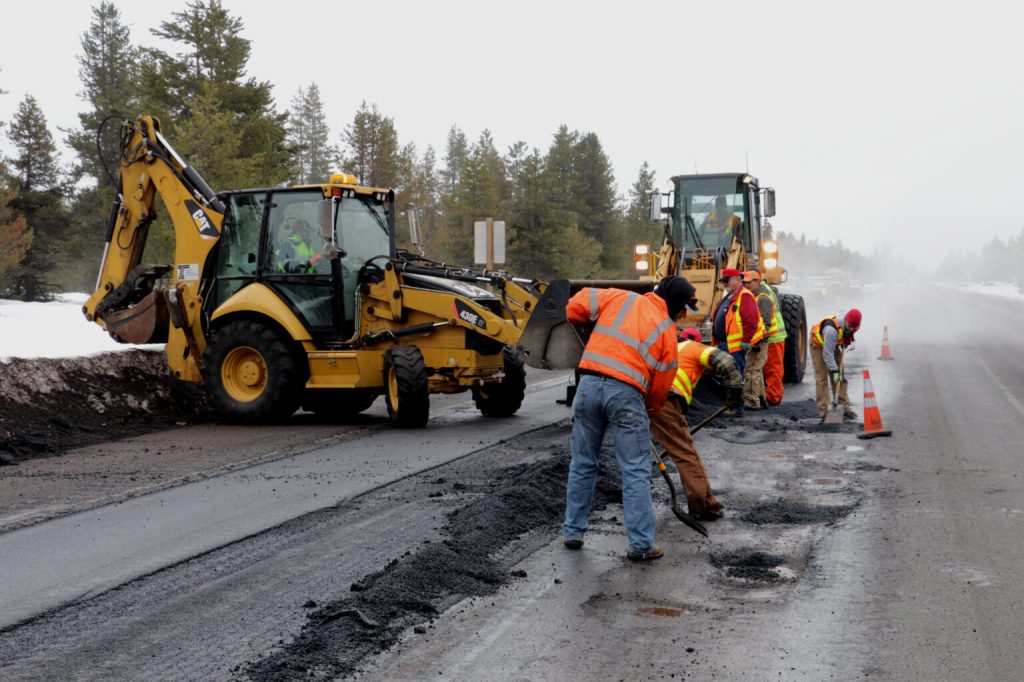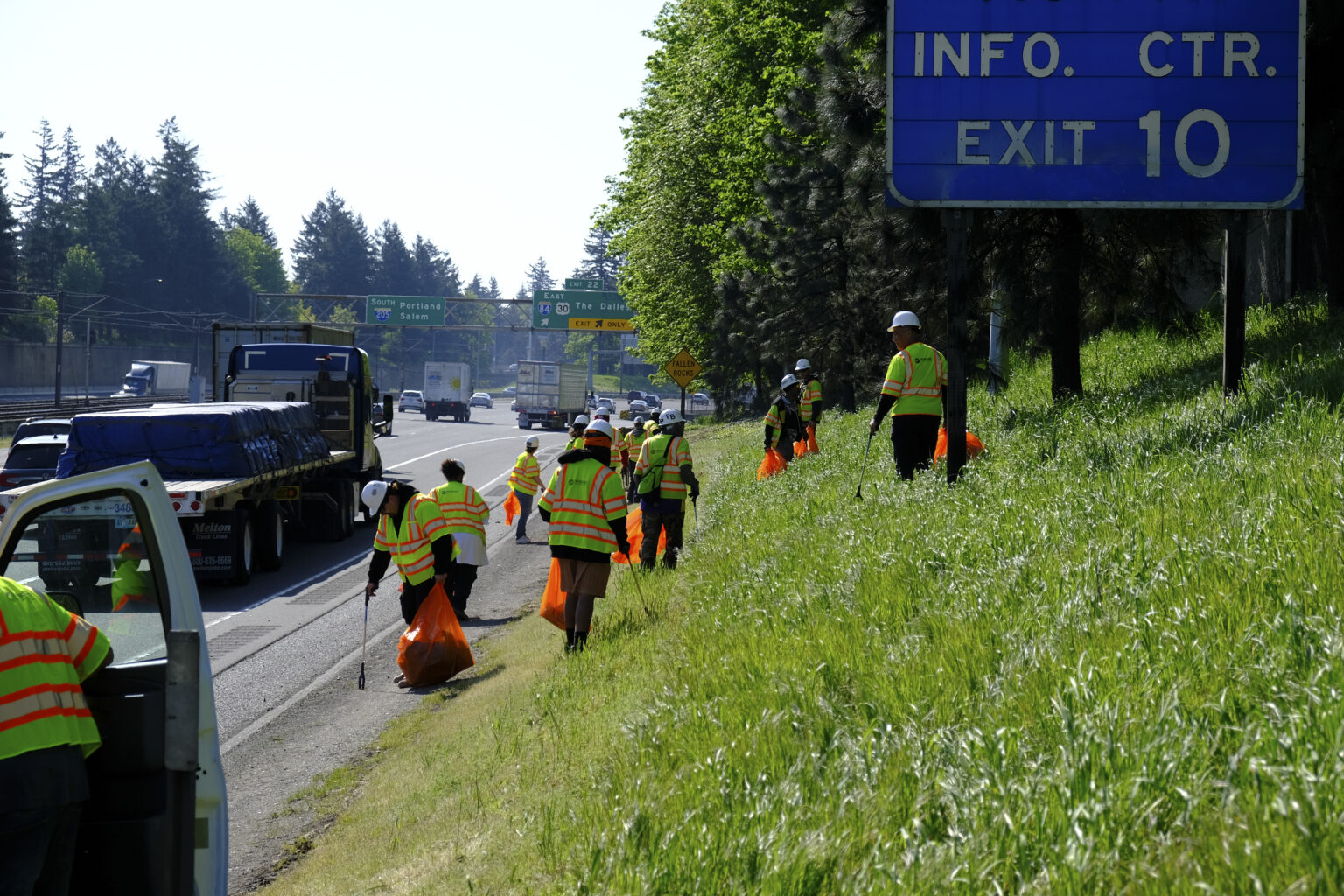Oregon Legislature’s last-ditch attempt for 3-cent gas tax increase fails
Published 6:34 am Monday, June 30, 2025

- Oregon Department of Transportation workers fill a pothole on U.S. Highway 97 near Chemult in 2016 (Oregon Department of Transportation/Flickr)
Oregon Democrats’ last-ditch effort to stave off hundreds of layoffs at the Oregon Department of Transportation by passing a 3-cent gas tax increase failed late Friday night after House Republicans refused to allow a vote.
House Speaker Julie Fahey, D-Eugene, introduced the last-minute amendment earlier Friday, pulling the plug on a transportation package more than a year in the making. Supporters and opponents alike described the proposed 3-cent gas tax increase and hike to vehicle registration and title fees as nothing more than a Band-Aid.
But the Oregon Department of Transportation won’t have even that Band-Aid to staunch the bleeding. The Legislature adjourned for the year shortly after 11 p.m. on Friday, after House Republicans refused to waive House rules to allow a vote.
Trending
The bill would have raised about $2 billion over the next 10 years, a far cry from the $11.7 billion lawmakers aimed to raise earlier.
House Majority Leader and committee chair Ben Bowman, D-Tigard, said he was “extremely frustrated” at what the bill became and that it is “not a transportation package.”
“I believe that people will die because we are not going to fund the broader transportation safety measures that our system needs,” he said. “My ‘yes’ vote tonight is because a ‘no’ vote is a vote not to pay for paving, not to pay for fault line striping, not to pay for filling potholes, not to pay for snow plowing. We have to protect these services.”
Testifying on the bill just after 6 p.m. on Friday, Gov. Tina Kotek said she understood how difficult it is to accept that a bill months in the making won’t succeed. But right now, she said, the most important thing is to make sure the Oregon Department of Transportation has the money it needs to avoid 600 to 700 layoffs. If the Legislature fails to pass the amendment, Kotek said she will begin to let workers go by as soon as Monday.
“No one is arguing that this solution is sufficient,” Kotek said. “It is a Band-Aid in every sense of the word.”
The bill would increase the state’s 40-cent gas tax by 3 cents, hike vehicle registration fees from $43 to $64 and increase vehicle title fees from $77 to $168. The roughly $2 billion estimated to result from those increases would go to the Oregon Department of Transportation, leaving cities and counties without additional funds.
Trending
The measure also includes some accountability measures, such as requiring regular audits of the transportation department and shifting responsibility to hire and fire the department’s director from the Oregon Transportation Commission to the governor. Still, opponents including Rep. Bobby Levy, R-Echo, said that wasn’t enough to justify the higher costs to taxpayers, especially the rural residents she represents who must drive more than their urban counterparts.
“We can’t just keep asking Oregonians — especially those who are already economically vulnerable — to pay more into a system that hasn’t proven it can manage the resources it has,” Levy told the committee.
Republicans issued their own proposals to raise money for roads and bridges that would not increase any taxes, but instead take and use millions of dollars meant for electric vehicle and bus programs, bike and pedestrian programs and climate programs.
The death of the original transportation package, House Bill 2025, is a blow to a legislative effort months in the making. Lawmakers traveled the state last summer, seeking public input on plans to overhaul the state’s transportation funding system.
The latest measure eliminates proposed increases to the transit payroll tax, which would have gradually tripled from 0.1% to 0.3%. Without the payroll tax increase, officials at Portland’s public transit agency TriMet said they’d have to cut 27% of their bus service, eliminating 45 of 79 bus lines. The tax increase would have cost an Oregonian making the state’s median annual income about $10 per month, according to TriMet’s analysis.
Transit supporters and other Oregonians who waited hours for the hearing to begin lambasted lawmakers for not listening to them.
Cassie Wilson, transportation policy manager for the nonprofit community planning group 1000 Friends of Oregon, said she opposed the amendment and wants lawmakers to vote on the $11.7 billion transportation tax-and-spending package instead.
“Transit keeps the 30% of Oregonians who can’t or don’t drive moving,” she said.
Bill Bradley, executive board officer for ATU Local 757, a public transit workers union, said up to 500 members could lose their jobs in the coming year if the state does not pass a more robust funding package.
Melissa Unger, executive director of the Service Employees International Union Local 503 that represents many transportation department employees, said her members supported everything advocates of the earlier bill wanted. With time running out before the Legislature must adjourn by Sunday, Unger said they needed some assurance that workers won’t lose their jobs.
“We ask that you either pass this or do something so that people in the next two weeks across our state and in every county do not receive layoff notices,” she said.
A proposal to mandate electric vehicle users pay a per-mile fee also didn’t make the final bill.
All tax increases in that bill are intended for the state transportation department, worrying cities and counties. Historically, transportation revenue has been split between the state, counties and cities, with the state taking 50%, 30% going to counties and 20% for cities.
Portland Mayor Keith Wilson said the bill “completely sidelines” local needs and means Oregon’s largest city will lose about 60 employees.
“It jeopardizes dozens of essential city jobs and undermines our ability to perform basic safety functions like filling potholes and implementing traffic safety improvements,” Wilson said. “In Portland, this means 300 streetlights that we won’t be able to repair this year.”
Benton County Commissioner Gabe Shepherd said he was one of about 20 county commissioners from around the state who waited hours to testify.
“Local governments cannot be left behind,” Shepherd said. “We cannot be an afterthought. We cannot be a fix for later.”
The long-awaited transportation package faced headwinds in recent days, as Republicans and moderate Democrats lined up against it. Rep. Kevin Mannix, R-Salem, was the only Republican to publicly support the larger measure, saying it wasn’t perfect but was better than nothing, while Sen. Mark Meek, D-Gladstone, doubled down on his objection to it.
“From the correspondence I’ve received from around the state of Oregon and my community both in letters, emails, phone calls, social media posts, I’m doing the right thing for Oregonians,” he said on the Senate floor Friday morning.
Following Kotek’s Friday testimony, House Republicans welcomed the package’s defeat in a press release, slamming Democrats for “forcing families to pay one of the largest tax hikes in history.” They did not address the Kotek-backed proposed amendment.
“While our work represents a major victory for working-class, low-income, and rural communities, House Republicans will continue to listen to and fight on behalf of Oregonians against any future taxes that raise the cost of living,” said House Minority Leader Christine Drazan, R-Canby. “We welcome House Democrats to join us.”





